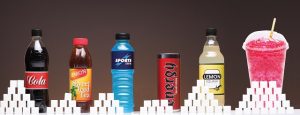Dental erosion, also known as erosive tooth wear, is caused by acid contacting and dissolving the tooth surface. This creates thinning of the enamel which can weaken the tooth and make it sensitive.
As the outer protective layer of enamel dissolves from the tooth surface, the dentine underneath is exposed; this can make the tooth sensitive. The dentine is softer than enamel and dissolves much easier in acid. Preventing dental erosion is very important for protecting our teeth.
Where does the acid come from?
The acid that causes erosion mainly comes from the food or drink. Common sources of dietary acids that have been linked to dental erosion are:
- Soft drinks
- Energy drinks
- Sports drinks
- Vinegar
- Citrus fruits
- Fruit juices
- Fruit-flavored water
- Fruit-flavored tea (e.g. lemon, peach, rosehip)
- Cordial
- Alcoholic drinks
- Sour (acidic) sweets/lollies
- Chewable Vitamin C tablets
- Effervescent or dissolvable vitamins/medications
Remember, even sugar-free food or drink can cause dental erosion if it’s high in acid. Common acidic food additives to be aware of are:
- Citric acid (food acid acidity regulator/antioxidant 330)
- Sodium citrate (food acid/acidity regulator/antioxidant 331)
- Malic acid (food acid/preservative 296)
- Ascorbic acid (Vitamin C/antioxidant 300)
- Fruit juice concentrate
Acid rising from the stomach can also cause dental erosion. This can happen after vomiting, or in conditions such as gastroesophageal reflux (acid reflux), anorexia nervosa, bulimia and pregnancy-related morning sickness.
What else can increase dental erosion?
As well as frequent exposure to acid, low salivary flow (dry mouth) can cause the risk of dental erosion. A healthy flow of saliva protects the teeth by washing away and neutralising acid.
Dry mouth can be caused by:
- Medications and taking multiple medications together
- Radiotherapy to the head/neck
- Stress
- Sjogren’s syndrome (an autoimmune disease)
- Smoking
- Diabetes
How can I prevent dental erosion?
Avoiding acidic food or drink is the best way to prevent dental erosion and there are some other things you can do. It’s important to remember:
- Only have acidic food and drink at meal times when your saliva levels are higher to protect your teeth
- When having something acidic, avoid keeping it in your mouth for too long and swallow it as quickly as possible
- Eat whole, low-acid fruit (e.g. banana, melon, pear, papaya) rather than drinking fruit juice
- Chill acidic drinks, as warm drinks are more likely to cause dental erosion
- After having anything acidic or after vomiting/reflux, rinse your mouth with water, plain milk, or a fluoride mouth rinse as soon as possible.
Speak to your dentist or medical doctor to find out if an underlying condition is increasing your risk of dental erosion.
What about brushing my teeth?
Good oral hygiene is essential for oral health. Previously it was recommended to wait 30-60 minutes to brush your teeth after contact with stomach or dietary acid so that saliva could repair the acid damaged tooth surface. However, recent evidence has suggested this amount of time is too short for saliva to repair the acid damage and there is no benefit to postpone tooth brushing for this length of time.
Therefore it is recommended to:
- Brush your teeth twice a day with a fluoride toothpaste
- Use a soft toothbrush with gentle action
- Rinse your mouth thoroughly with water, plain milk or a fluoride mouth rinse as soon as possible if your teeth are exposed to acid
Consider using a toothpaste containing stannous fluoride (SnF2) as it can be more protective against erosion than other types of fluoride.
*This article was published by the Australian Dental Association Victoria Brunch, October 2018
Sugary drinks and your health – Need a drink? Choose tap water!*
Drinking tap water is a great, inexpensive way to stay hydrated and have a healthy smile! Choose tap water over sugary drinks when you’re thirsty. Sugary drinks can cause tooth decay, contribute to weight gain and obesity, and increase your risk of Type 2 diabetes, 13 types of cancer, heart disease and other health problems.
How much sugar is in sweetened drinks?
Sugary drinks include soft drink, energy drink, sports drink, fruit juice, flavored tea and flavored milk. Just one 600 ml bottle of soft drink can contain up to 16 teaspoons of sugar!
Sugary drinks and your body
- Sugar and Acid can cause tooth decay
- One can of soft drinks a day can lead to 6.5 Kgs of weight gain in a year
- Overweight and obesity increase the risk of Heart disease, Kidney disease, Type-2 Diabetes, Stroke and some Cancers.
How to drink more water and less sugary drinks
- When eating out, ask for tap water or sparkling water instead of a sugary drink
- Save the money you would usually spend on sugary drinks to put towards something else you can enjoy
- Tale a reusable water bottle with you when you go out to places where tap water isn’t available
- Keep a glass of water near you at work or home
- Drink tap water to re-hydrate during or after exercise – only elite athletes would benefit from the electrolytes in sports drinks
- Plain milk (or alternatives) and coffee or tea without added sugar are also good options.
The World Health Organisation recommends consuming no more than seven teaspoons of added sugar per day (27.5 gr 5%of total energy intake) to greatly reduce your risk of tooth decay, obesity and other chronic diseases.
How many teaspoons of sugar?
Source: Rethink sugary drinks, http://www.rethinksugarydrink.org.au
*This article was published by the Australian Dental Association Victoria Brunch, March 2019
